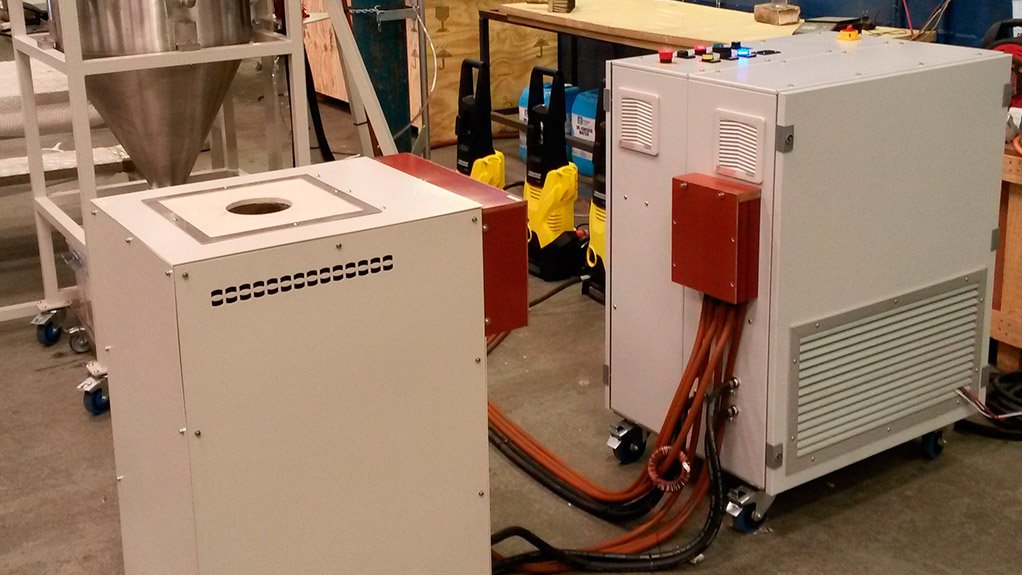Increased demand for South African smelting tech
As Africa’s mining industries consider new methods of processing precious metals and base metals, the demand for South African induction-heating technologies on the continent is increasing, says induction-heating solutions company Hot Platinum.
Hot Platinum MD Ali Brey tells Mining Weekly that this renewed demand has significantly increased company clientele on the continent. The company manufactures induction-heating equipment and develops technology for melting and casting gold, platinum, copper and various other metals.
“There is a significant increase in the demand for our equipment from West, Central and Southern Africa owing to the number of new mining operations starting and many African countries wanting to process their metals in their countries,” he explains.
Brey highlights Hot Platinum’s status as a South African company as a contributing factor to its success in the African market, as it understands the African environment better than European and Asian competitors and can tailor clients’ systems and technologies to the African environment. The company customises systems and technologies to suit client specifications.
Brey also points out that mining companies operating in Africa take part in the development of local expertise when contracting Hot Platinum.
He tells Mining Weekly that the company has registered heightened demand from small-scale mining projects, adding that small-scale miners commonly use flames and resistance furnace heating as melting techniques, but that these techniques are time consuming and inefficient.
“Resistance furnaces also do not last very long. The melting techniques tend not to mix the gold properly, which results in inaccurate sample measures of the gold content in what is being melted,” Brey elaborates.
Hot Platinum’s induction-heating technology is a frequency-conversion technology, commonly known as an inverter or power pack, which converts State-owned power utility Eskom’s standard 50 Hz supply frequency and three-phase 400 V to the requirements of an induction-heating application. This typically ranges from 500 Hz to 50 kHz at an output voltage of 100 V to 1 000 V. This allows for gold to be melted much faster, using significantly less energy.
Brey explains that demand from the South African mining industry usually stems from refineries, which are upgrading their systems and equipment to enable quicker melt times and operational cost reductions.
“Our technology is a completely integrated solution for melting and casting gold – from 1 kg up to 2 t at a time,” he details.
Brey mentions that while the induction-heating technology for metals melting and casting has been available in the market for years, Hot Platinum’s technology is significantly more energy efficient, compared with similar technology supplied by competitors.
“From a reliability point of view, our system comprises an isolated gate bipolar transistor-based induction power supply, which is significantly more advanced than most of the existing systems available on the market.
“The system ensures that the maximum amount of energy is transferred to the load,” he says, adding that Hot Platinum combines its induction-heating systems with a high level of system automation to ensure systems are easy to use, enhance operational efficiency and that they can be monitored remotely or integrated into the refineries’ supervisory control and data acquisition systems.
Hot Platinum offers its clients a high level of technical support, as its systems are fully manufactured in South Africa.
Gold Atomising System
In 2013, Hot Platinum launched a compact gold atomising system, which produces fine gold powder, with particle sizes ranging from 0.1 mm to 1 mm.
Brey states that the system is ideal for gold refining applications. As the fine particles increase the surface area of the gold, it significantly decreases the time taken to dissolve the gold into the acid solution from around six hours to one hour.
“In addition, the same system can be used to melt and cast gold bars of up to 15 kg, thus providing a complete solution for a gold refinery,” he concludes.
Article Enquiry
Email Article
Save Article
Feedback
To advertise email advertising@creamermedia.co.za or click here
Press Office
Announcements
What's On
Subscribe to improve your user experience...
Option 1 (equivalent of R125 a month):
Receive a weekly copy of Creamer Media's Engineering News & Mining Weekly magazine
(print copy for those in South Africa and e-magazine for those outside of South Africa)
Receive daily email newsletters
Access to full search results
Access archive of magazine back copies
Access to Projects in Progress
Access to ONE Research Report of your choice in PDF format
Option 2 (equivalent of R375 a month):
All benefits from Option 1
PLUS
Access to Creamer Media's Research Channel Africa for ALL Research Reports, in PDF format, on various industrial and mining sectors
including Electricity; Water; Energy Transition; Hydrogen; Roads, Rail and Ports; Coal; Gold; Platinum; Battery Metals; etc.
Already a subscriber?
Forgotten your password?
Receive weekly copy of Creamer Media's Engineering News & Mining Weekly magazine (print copy for those in South Africa and e-magazine for those outside of South Africa)
➕
Recieve daily email newsletters
➕
Access to full search results
➕
Access archive of magazine back copies
➕
Access to Projects in Progress
➕
Access to ONE Research Report of your choice in PDF format
RESEARCH CHANNEL AFRICA
R4500 (equivalent of R375 a month)
SUBSCRIBEAll benefits from Option 1
➕
Access to Creamer Media's Research Channel Africa for ALL Research Reports on various industrial and mining sectors, in PDF format, including on:
Electricity
➕
Water
➕
Energy Transition
➕
Hydrogen
➕
Roads, Rail and Ports
➕
Coal
➕
Gold
➕
Platinum
➕
Battery Metals
➕
etc.
Receive all benefits from Option 1 or Option 2 delivered to numerous people at your company
➕
Multiple User names and Passwords for simultaneous log-ins
➕
Intranet integration access to all in your organisation




















